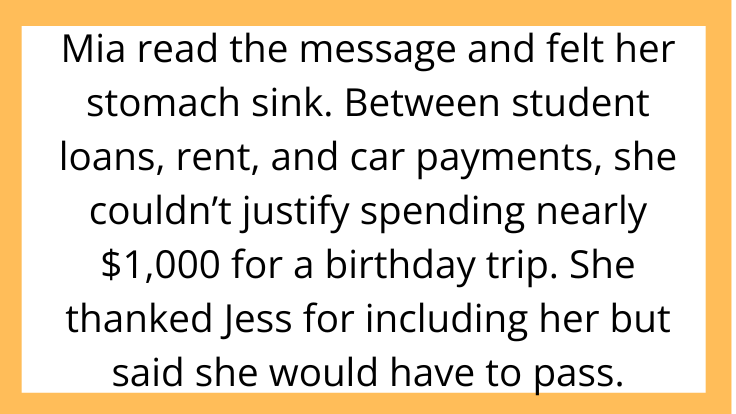AITAH for Not Wanting to Pay for My Friend’s Birthday Trip After She Picked an Expensive Destination?
When it comes to celebrating milestones, it can feel like there’s an unspoken rule: you’re supposed to go along with whatever the guest of honor wants. But what happens when the plan turns into something you can’t afford—or just don’t want to spend money on?
In this AITAH scenario, a young professional shared her story about being pressured to fund a lavish birthday getaway she never agreed to. Let’s break down what happened and ask the big question: Is she really the villain for saying no?
The Story: An Invitation That Wasn’t Really an Invitation

The original poster, who we’ll call Mia, is 26 and works in marketing. She has a close-knit group of friends she’s known since college, including her longtime friend Jess, who was turning 30.
A few months before Jess’s birthday, she sent out a group text:
“I want to do something unforgettable for the big 3-0! I’m thinking Tulum for a long weekend. Flights are around $600, plus the villa is about $350 a person. Let’s do it!”
Mia read the message and felt her stomach sink. Between student loans, rent, and car payments, she couldn’t justify spending nearly $1,000 for a birthday trip. She thanked Jess for including her but said she would have to pass.
She thought that was the end of it.
The Pressure Campaign Begins

A week later, the group chat was buzzing with plans: matching swimsuits, fancy dinners, Instagram hashtags. Mia quietly stayed out of it. But then Jess messaged her privately.
“Hey, I noticed you haven’t paid your share for the villa. Can you send it soon? I had to put the deposit down to reserve it.”
Mia reminded Jess she wasn’t coming. But Jess insisted:
“We all agreed on this. I already counted you in when splitting costs. If you don’t pay, everyone else’s share goes up. Please don’t bail.”
Mia apologized but stood firm. She never confirmed she was going. She never agreed to be financially responsible. She told Jess she wouldn’t be paying.
Jess called her selfish and unsupportive. Other friends started messaging Mia, saying she was ruining the trip and that “this is what good friends do.”
Feeling guilty but also frustrated, Mia asked Reddit:
AITAH for refusing to pay for a trip I never agreed to join?
The Internet’s Verdict: Clear Boundaries Are Not Selfish

The r/AITAH community quickly rallied around Mia. The top comment summed it up best:
“If you never confirmed, you have no obligation. Jess decided to gamble by reserving without everyone’s consent. That’s on her.”
Other users pointed out:
-
Consent matters: Participation in a trip isn’t assumed. You must explicitly agree.
-
Financial pressure is manipulative: Expecting someone to pay hundreds of dollars they don’t have is unreasonable.
-
Friendship isn’t transactional: Supporting friends doesn’t mean ignoring your own boundaries.
A few commenters sympathized with Jess’s excitement to plan something big. But they still agreed she overstepped by assuming everyone would—and could—pay.
The Underlying Issue: Different Lifestyles, Different Expectations

This situation highlights a growing challenge among friend groups in their twenties and thirties: financial disparities.
Some people have disposable income for elaborate vacations. Others are still paying off loans or saving for major life expenses. When one person’s “normal” spending is another person’s financial crisis, conflict is inevitable.
What makes it worse is when someone decides for everyone else—and then tries to guilt them when they don’t fall in line.
How Mia Could Handle the Fallout

If you’re in Mia’s shoes, here are some options for moving forward:
-
Restate your position calmly
-
“I care about you, but I can’t afford this trip and never agreed to pay. I hope you have an amazing time.”
-
-
Set expectations for future plans
-
“Going forward, please don’t count me in on plans until I’ve confirmed.”
-
-
Offer an alternative way to celebrate
-
“If you’d like, I’d love to take you to dinner when you get back.”
-
-
Stand firm if the guilt-tripping continues
-
True friends will respect your boundaries, even if they’re disappointed.
-
Takeaway: Declining Isn’t the Same as Abandoning

Saying “no” doesn’t make you unsupportive—it makes you honest. Too often, people equate financial sacrifice with loyalty. But real friendship isn’t measured by how much money you spend to prove you care.
Mia isn’t the villain for refusing to pay for a trip she never agreed to. She’s simply someone who knows her limits and is brave enough to enforce them.



